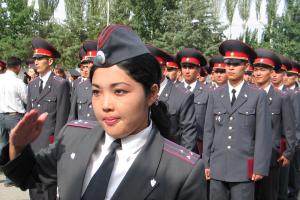A Master’s in economic governance at the OSCE Academy
Hussaini Azada Mohammad, a 27-year old woman from Afghanistan, says that she chose to enrol in the OSCE Academy in Bishkek’s new Master’s programme in economics because of its practical approach and focus on Central Asia: “The students are from all over the region and we are constantly comparing the different practices in our countries. Afghanistan is a special case, but there is also culture and history we all share.”
Azada spent her childhood and youth as a refugee. She was born in Iran, educated in Pakistan and studied in the United States. On completion of her studies at the Academy, she plans to return to Afghanistan.
I always wanted to go back after graduation. I want to contribute to my country’s development and I am sure that the knowledge I will acquire through this programme will help.
Hussaini Azada Mohammad
The OSCE Academy launched its new Master’s in Economic Governance and Development at the beginning of this year to complement the Master’s in Politics and Security it has been offering since 2004. Practically all of the courses concern Central Asia indirectly or directly. There are applied modules on governance, water, energy and trade. A course on money laundering, a priority topic under this year’s Irish OSCE Chairmanship, is currently being developed. It will reflect the practice of financial intelligence units in Central Asia.
The decision by the OSCE Academy to launch a study programme focussing on economics reflects the participating States’ conviction that good economic governance is essential for Central Asia’s future stability and prosperity. “Stable states with transparent and accountable policies attract foreign and domestic investment, enabling governments to reduce poverty and promote equality and social integration,” Goran Svilanović, the Co-ordinator of OSCE Economic and Environmental Activities, told students at a special introductory seminar in March.
Contributing to their country
The Master’s in Economic Governance and Development has been officially approved by the Ministry of Education of the Kyrgyz Republic, which as the OSCE Academy’s host country has frequently acknowledged the institution’s usefulness and encouraged the expansion of its academic curriculum.
Twenty-two-year-old Daniyar Moldokanov, who was born in Bishkek and earned his first degree at the American University of Central Asia located in the city, had already started a career at the Ministry of Finance of Kyrgyzstan when he decided to enrol in the programme. “I was finding the style of government still much influenced by older methods and practices and looking for fresh ideas that could help me support my country,” he recounts.
Several months into his studies, Daniyar says that one of the things he finds most interesting is that the courses are still being elaborated and tailored. “Being a part of this process in a kind of experimental academic group is amazing. Since we are all graduates in economics and many of us have work experience, we are capable of asking questions that result in fruitful exchanges,” he says. Maxim Ryabkov, the Director of the OSCE Academy, gives an example of student input into the curriculum’s development: “Students have shown much interest in international and regional trade agreements, and this has prompted the school to think of strengthening the components dealing with this issue.”
The institution’s encouragement of students’ practical involvement also extends to assisting them in finding external opportunities for learning by doing. “Internships are a very important part of the educational process in a programme that, like ours, focuses on policy and governance issues. We are working to establish partnerships with relevant institutions where our students might be interning,” Ryabkov says.
The OSCE Academy is noteworthy not only for what it offers its students but also because of the insight its research and discussions bring to the OSCE as a whole. Ambassador Andrew Tesoriere, who chairs the Academy’s Board of Trustees and for the past four years headed the OSCE Centre in Bishkek, describes it as a two-way mirror: “Through higher education, research and debate, the Academy disseminates shared OSCE values, probes core topical issues, and lifts understanding within the whole OSCE community. I see each Academy student as a potential future leader, each roundtable as generating innovative thinking, and the Academy well attuned to the needs and context of Central Asia and the wider region.”
Many OSCE participating States recognize the importance of education in the development of Central Asia. The Academy has received funding from 21 participating States. In 2012, it is funded by Austria, Finland, Germany, Denmark, Norway, the Geneva Centre for Security Policy and the United States, as well as from the Unified Budget. The new Master’s programme in Economic Governance and Development is funded by Austria, the Norwegian Institute of International Affairs and the United States. For Austria, the fact that Afghan students are participating – there are currently nine at the Academy – was an important reason for co-funding the programme. At the Vilnius Ministerial Council in December 2011, the OSCE took the decision to widen its co-operation with Afghanistan to include economic and environmental and human issues. “Bringing students from Afghanistan and Central Asia together in this programme, allowing them to gain profound economic knowledge and to develop cross-border professional and personal ties is a very concrete contribution towards this political goal,” explains Robert Müller of the Austrian delegation to the OSCE.


